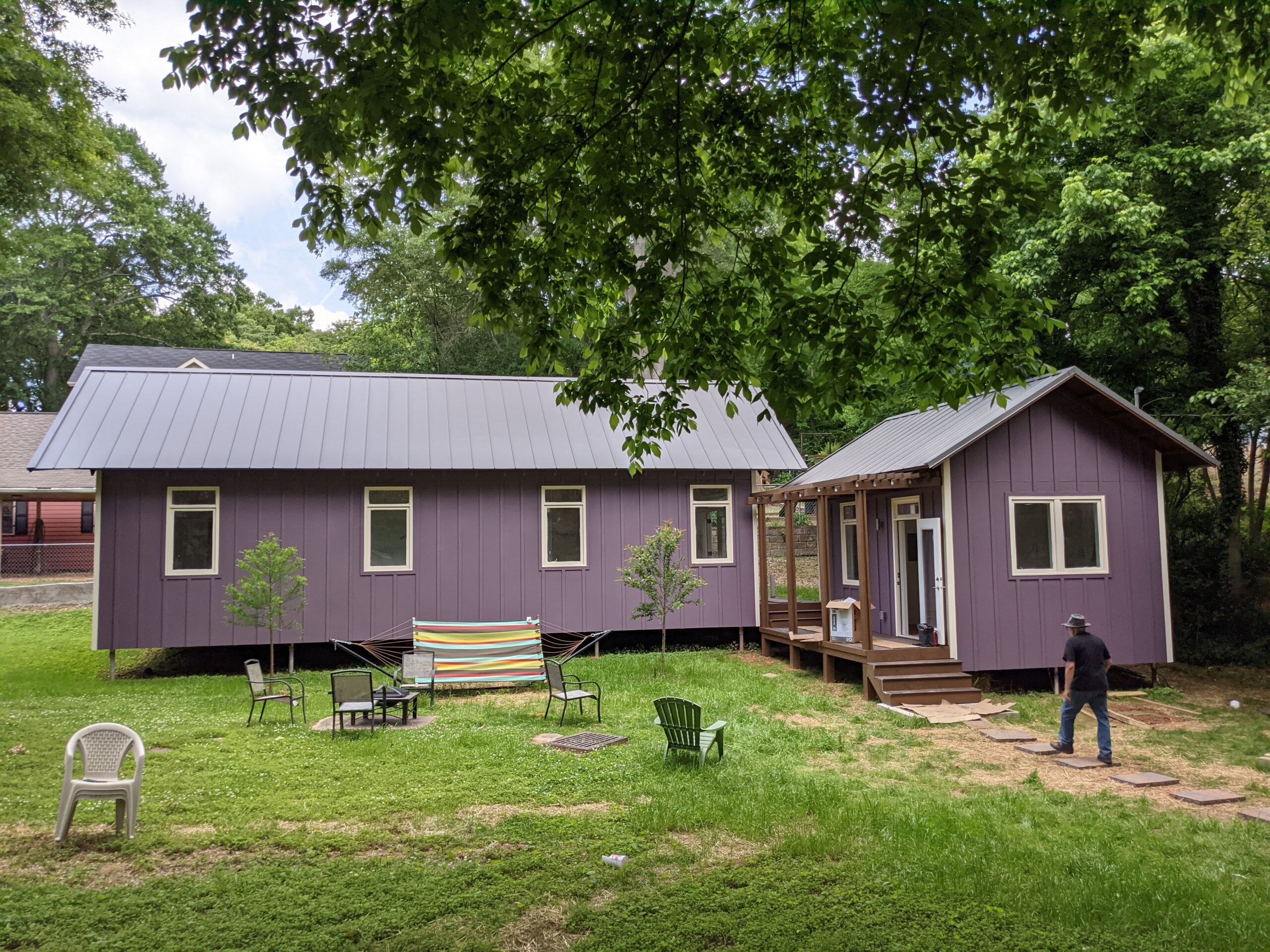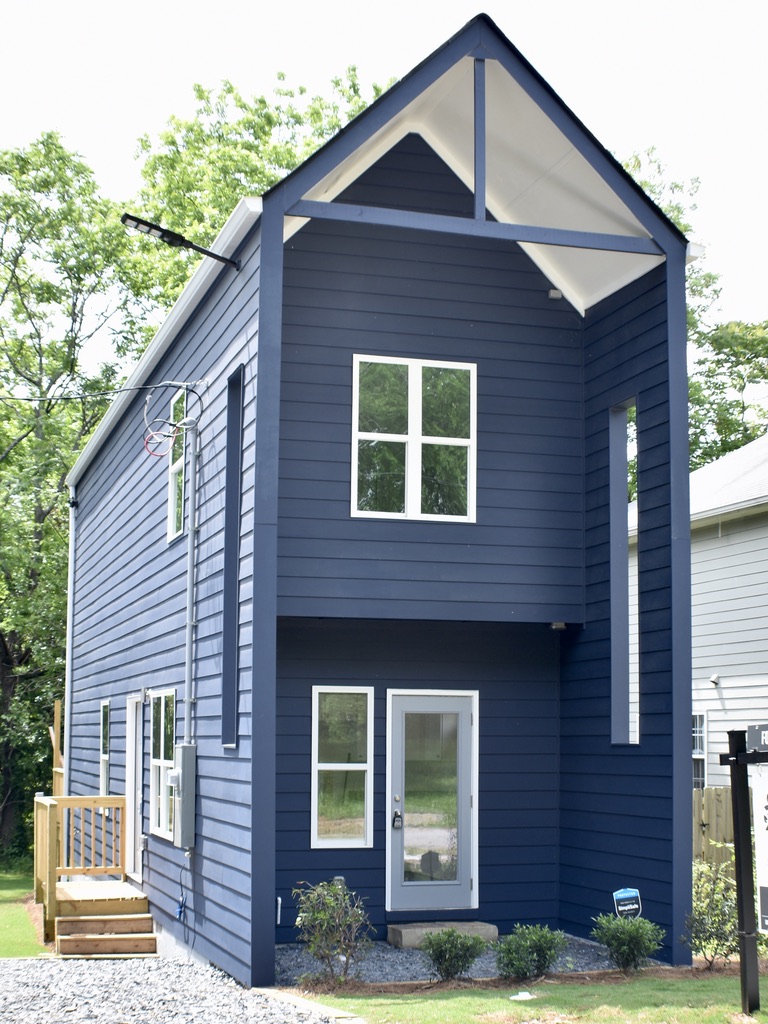Small But Mighty: How Small-Scale Developers Are Reimagining Atlanta’s Affordable Housing Playbook
An affordable home in a healthy neighborhood is fundamental to safety, stability, and opportunity. Community development financial institutions (CDFIs) like Reinvestment Fund play a vital role in using flexible capital to support housing that is affordable and responsive to the needs of the local community. Flexible capital includes a wider underwriting box with features such as lower borrower equity requirements, higher than standard loan-to-value requirements, lower debt service coverage (DSCR) requirements.
CDFI investments in residential developments by small scale or nonprofit developers play an outsized role in boosting local economies and increasing the inventory of available affordable housing. Many of these developers create housing in established communities, using infill strategies that build new construction on vacant lots or renovate existing structures.
 Reinvestment Fund’s approach to affordable housing has been as an advisor and collaborator. Leveraging our 35+ years of experience in affordable housing finance, we are using our capital to help small scale and nonprofit developers in this sector grow. In Atlanta, our work in the affordable housing sector has included developers such as Fortas Homes, Backyard ATL, and Urban Oasis Development.
Reinvestment Fund’s approach to affordable housing has been as an advisor and collaborator. Leveraging our 35+ years of experience in affordable housing finance, we are using our capital to help small scale and nonprofit developers in this sector grow. In Atlanta, our work in the affordable housing sector has included developers such as Fortas Homes, Backyard ATL, and Urban Oasis Development.
Fortas Homes is a small-scale developer that is preserving affordable housing in rapidly appreciating neighborhoods like Pittsburgh, Summerhill, and near Georgia State University. “We are a leader in developing new ways to allow for vastly more people to have a safe and affordable place to live,” explains Jim Cheeks who leads Fortas. “As these barriers are removed, our market expands and creates our ability to continue our significant growth. This growth not only benefits our home buyers and our team but also our community.”
Reinvestment Fund financing is helping Fortas acquire and rehabilitate rental and for-sale homes in these neighborhoods. Fortas prioritizes naturally occurring affordable housing, relying on financing rather than government subsidy to grow the city’s inventory of affordable for-sale and rental housing.
In times of economic uncertainty, flexible capital can also be difficult to access as conventional credit sources tighten their requirements. CDFIs like Reinvestment Fund play a critical role as reliable capital partners, particularly for smaller-scale developers who are most impacted when banks pull back on lending.
“Access to capital limited our growth until we began partnering with Reinvestment Fund and other mission driven lenders,” says Cheeks. “Traditional lending practices do not value or understand our type of development. Some mission-driven developers spend too much time and effort looking for a small and dwindling pool of subsidies. We take a different tack and have renounced all efforts to obtain government subsidies, and that has also allowed our business to be in our current growth phase.”
Reinvestment Fund has also been working with Urban Oasis Development, an Atlanta-based housing developer that is creating inclusive and flourishing neighborhoods. Urban Oasis has been working to incrementally improve neighborhoods, without displacing existing residents. The goal is to invest in neighborhoods through housing development that helps the community build wealth.
“Our development approach is community-centered and focuses on people over sticks and bricks,” said Joel Dixon, Principal at Urban Oasis. “In order to provide a mix of housing across a variety of affordable price points we have benefitted from the funding flexibility and innovative housing solution approach of CDFIs like Reinvestment Fund. They provided the first moderate-interest construction loan our company received as we expanded to provide mixed-income for-sale housing in the westside of Atlanta.”
The capital enabled Urban Oasis to be the first builder to partner with Atlanta Land Trust to provide for-sale housing that could also be permanently affordable via a community land trust model. Today that neighborhood is already experiencing gentrification pressures on housing prices but Urban Oasis properties will remain affordable for future homebuyers.
Dixon shared “Without Reinvestment Fund’s partnership, we likely wouldn’t have been able to get funding for the project since the structure didn’t fit a traditional construction lending profile. Now that same model will be used for a larger project of 40 permanently affordable for-sale homes in the Grove Park area.”
 Reinvestment Fund’s financing strategy also aims to help small-scale developers establish proof of concept for innovative models. For example, Backyard ATL is building affordable housing on land that would not otherwise serve the community. Working to preserve and expand affordable housing in South Atlanta, Backyard ATL is designing and building Accessory Dwelling Units (ADUs) behind primary residences on single-family lots. The model supports additional density in low to moderate income communities without displacing existing homeowners, allowing existing residents to reap the benefits of neighborhood improvement.
Reinvestment Fund’s financing strategy also aims to help small-scale developers establish proof of concept for innovative models. For example, Backyard ATL is building affordable housing on land that would not otherwise serve the community. Working to preserve and expand affordable housing in South Atlanta, Backyard ATL is designing and building Accessory Dwelling Units (ADUs) behind primary residences on single-family lots. The model supports additional density in low to moderate income communities without displacing existing homeowners, allowing existing residents to reap the benefits of neighborhood improvement.
For Backyard ATL developer Pavan Iyer, the challenge is trying to solve the paradox of the need for new housing and the fabric of an existing community. “Affordable housing is THE most important cog in the series of parallel running gears that make-up a healthy and equitable social ecosystem. The challenge is and will always be how to create new housing and integrate our housing and story into the existing community, so it is of mutual benefit.”
Another big challenge for affordable housing development in established neighborhoods is existing zoning codes. Fortas’ Jim Cheeks explains, “Affordable housing is hindered by decades of exclusionary housing policy, which often was performed by our own government. We are constantly advocating for better zoning and learning how to find a road map to get through existing codes. We are forced to push the limits and think outside the box in order to build homes that can offer more density and better options for the customer.”
Controlling costs of development can also be a challenge. These projects are typically on scattered sites and new construction on smaller sites can be expensive compared to large site new development. Changes in market can affect land cost, labor, and much more. Managing costs during the pandemic has been particularly difficult. For example, the cost of lumber alone is up almost 200% from a year ago.
In addition to supporting smaller-scale developers directly through our financing, Reinvestment Fund has also financed investment vehicles in markets beyond Atlanta, including Jumpstart who works with startup or undercapitalized housing developers. Through these investments, Reinvestment Fund is also reaching new entrepreneurs who are part of populations that are historically underrepresented in development including people of color and women.
Through partnerships like Jumpstart, Reinvestment Fund is investing flexible capital in an ecosystem to build wealth for entrepreneurs and neighborhoods. We are so proud of the impact we have made in Atlanta since our first loan in December 2015. We look forward to deepening our impact by developing new and continuing existing partnerships with small-scale developers of affordable housing and hope that others will follow our lead to support more disrupters like those named in this article.
Want to learn more about our housing financing or how to invest with us? Reach out to us today.
Originally published in the Saporta Report, May 31, 2021